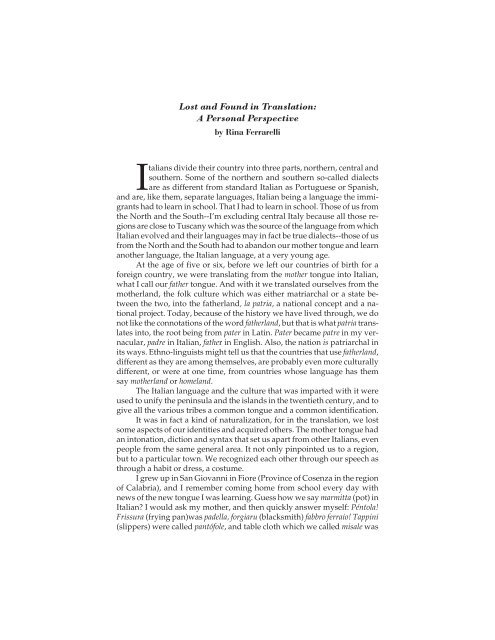Journal of Italian Translation
Journal of Italian Translation
Journal of Italian Translation
Create successful ePaper yourself
Turn your PDF publications into a flip-book with our unique Google optimized e-Paper software.
Lost and Found in <strong>Translation</strong>:<br />
A Personal Perspective<br />
by Rina Ferrarelli<br />
<strong>Italian</strong>s divide their country into three parts, northern, central and<br />
southern. Some <strong>of</strong> the northern and southern so-called dialects<br />
are as different from standard <strong>Italian</strong> as Portuguese or Spanish,<br />
and are, like them, separate languages, <strong>Italian</strong> being a language the immigrants<br />
had to learn in school. That I had to learn in school. Those <strong>of</strong> us from<br />
the North and the South--I’m excluding central Italy because all those regions<br />
are close to Tuscany which was the source <strong>of</strong> the language from which<br />
<strong>Italian</strong> evolved and their languages may in fact be true dialects--those <strong>of</strong> us<br />
from the North and the South had to abandon our mother tongue and learn<br />
another language, the <strong>Italian</strong> language, at a very young age.<br />
At the age <strong>of</strong> five or six, before we left our countries <strong>of</strong> birth for a<br />
foreign country, we were translating from the mother tongue into <strong>Italian</strong>,<br />
what I call our father tongue. And with it we translated ourselves from the<br />
motherland, the folk culture which was either matriarchal or a state between<br />
the two, into the fatherland, la patria, a national concept and a national<br />
project. Today, because <strong>of</strong> the history we have lived through, we do<br />
not like the connotations <strong>of</strong> the word fatherland, but that is what patria translates<br />
into, the root being from pater in Latin. Pater became patre in my vernacular,<br />
padre in <strong>Italian</strong>, father in English. Also, the nation is patriarchal in<br />
its ways. Ethno-linguists might tell us that the countries that use fatherland,<br />
different as they are among themselves, are probably even more culturally<br />
different, or were at one time, from countries whose language has them<br />
say motherland or homeland.<br />
The <strong>Italian</strong> language and the culture that was imparted with it were<br />
used to unify the peninsula and the islands in the twentieth century, and to<br />
give all the various tribes a common tongue and a common identification.<br />
It was in fact a kind <strong>of</strong> naturalization, for in the translation, we lost<br />
some aspects <strong>of</strong> our identities and acquired others. The mother tongue had<br />
an intonation, diction and syntax that set us apart from other <strong>Italian</strong>s, even<br />
people from the same general area. It not only pinpointed us to a region,<br />
but to a particular town. We recognized each other through our speech as<br />
through a habit or dress, a costume.<br />
I grew up in San Giovanni in Fiore (Province <strong>of</strong> Cosenza in the region<br />
<strong>of</strong> Calabria), and I remember coming home from school every day with<br />
news <strong>of</strong> the new tongue I was learning. Guess how we say marmitta (pot) in<br />
<strong>Italian</strong>? I would ask my mother, and then quickly answer myself: Péntola!<br />
Frissura (frying pan)was padella, forgiaru (blacksmith) fabbro ferraio! Tappini<br />
(slippers) were called pantófole, and table cloth which we called misale was
















